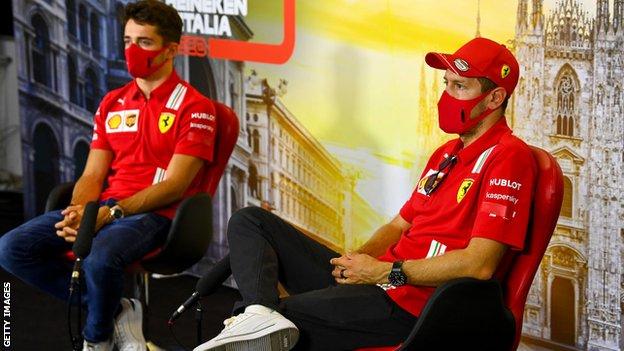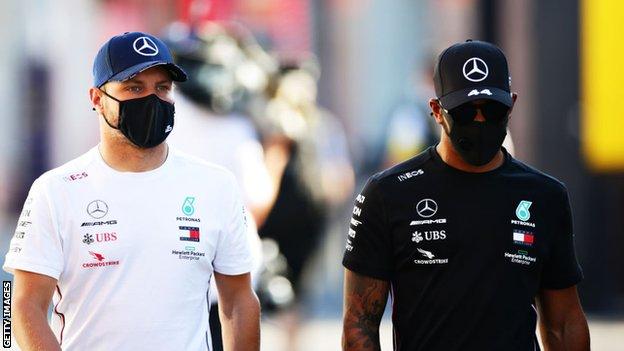
Ferrari’s Sebastian Vettel says Formula 1 faces “big challenges” to secure its future in the context of the world’s environmental problems.
“Being critical, you could ask where F1 is and what place it fills – you need to be serious about that,” Vettel said.
“There are some big questions to be answered to make sure this sport is still around in years to come.”
Lewis Hamilton said F1 would “have have to continue moving in the direction of going electric at some stage”.
F1 last year launched a plan to become carbon neutral by 2030, and among the sport’s plans are a move towards synthetic fuels when the next engine formula is introduced later this decade. These use carbon captured from the atmosphere in their manufacture.
The turbo-hybrid engines introduced into F1 in 2014 have led to a revolutionary step forward in efficiency. Normal road-car engines are in the region of 30% thermal efficiency – the conversion of fuel-energy to power – and F1 engines are above 50%.
But Vettel believes F1 should move further in this direction.
“F1 is held around the globe every year and in many different countries and as a global sport we should act responsibly,” the four-time champion said.
“F1 should be setting examples rather than reacting to pressure from the outside.
“When it comes to the environment, we are burning fuel which is a very small amount of the total carbon footprint but still we need to start acting more and more setting the right example, not just on carbon footprint, but on other things.
“Small things – but I do think every little bit makes a difference – the amount of plastic bottles we consume during the weekends there are solutions to that, how we power some panels in the paddock, there are solutions to that.
“F1 is the pinnacle of motorsport in terms of the development of the cars, and when you talk about the cars there is more than can be done to have a greater relevance in the future.”
Hamilton also backed Vettel’s views on consumables, pointing out that before the coronavirus pandemic stopped anyone but essential personnel attending races there was “a huge amount of waste that comes away from the weekend in terms of food, for hospitality services, plastic bottles. I can’t imagine how many thousands of plastic bottles come from each weekend”.
“F1 should definitely be working with organisers – and I am sure they are – to make sure they operate as cleanly as possible and minimise waste,” he added.
Prospects for the Italian Grand Prix

Hamilton heads into this weekend’s Italian Grand Prix only two wins away from equalling Michael Schumacher’s all-time record of 91 victories.
The F1 teams are facing a rule change on engines for this weekend’s race, with a ban on the changing of engine modes.
Some have seen that as targeting his Mercedes team, who have a particularly effective full-power mode for brief use in qualifying.
But Hamilton said he believed it would make little difference.
Hamilton said: “[We will have] better race pace. We lose a little bit [in qualifying] but it’s not the end of the day. Everyone will lose something but some more than others. I don’t think it’s going to be a problem for us.
“I find it amusing because [governing body] the FIA said it was so they could manage everyone’s use of the engine but Red Bull said they were pushing for it. Completely different reasons.
“It’s a compliment at the end of the day – the guys have done such a fantastic job with the engine. We will continue to do the best we can and we will see how it plays out.”
Williams driver George Russell, a Mercedes young driver whose team use the German company’s engines, said the move would increase Mercedes’ advantage in a year they area already dominating.
“I think it will probably affect us and Racing Point more than Mercedes purely because Mercedes are so far ahead in qualifying,” Russell said.
“And it will probably help them in the race. So the whole idea of slowing them down is going to go completely the opposite and way and enhance their performance.
“On a Saturday it will affect us by a tenth [of a second] or two, but also the other manufactures by a tenth. So we are probably net 0.1secs down on a Saturday but on Sunday we are net up by a big margin.
“What Mercedes have done to improve the engine to allow us to run a very high engine mode for the whole race is really impressive. She’s going to be flying on the Sundays.”